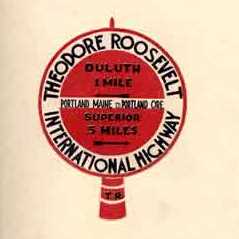It goes without saying that I appreciate the value of highways. Fundamentally, they are the basis on land of the great network of trade routes which go to make up civilization.
Theodore Roosevelt, quoted in in the Montana Guidebook to the Theodore Roosevelt International Highway, 1921
A nation’s transportation network is among its most important sources of economic and geopolitical strength. Few knew this better than Theodore Roosevelt and so it was fitting that the first transcontinental highway was christened with his name after TR’s death in 1919 (see this guidebook from the Montana portion). It was the precursor of the numbered US Highway system and eventually the Interstate Highway system. All of those projects were designed to unify America and brought Americans together through the experience of travel.
The bipartisan infrastructure bill recently agreed to between President Biden and the Congress is in the tradition of this drive for national unity. The new bill addresses the sorry state of many of our roads, ports and other critical infrastructure while leaving more controversial issues for later legislation. It authorizes $550 billion in new money over five years along with another $500 billion in previously authorized expenditures (hence the $1 trillion price tag referenced in some news reports). Specifically, the new money will be spent in the following areas:
Transportation– $284 billion to be spent to repair roads, bridges, ports and railways
Utilities– $243 billion for upgrading electric power infrastructure and replacing old pipe to stop lead from leaching into municipal water systems. It also includes $55 billion to extend broadband Internet service to rural communities, which is desperately needed to spur healthy economic development here in the Western states.
Environmental Cleanup – The Superfund program for cleaning up hazardous waste sites, mines and wells has been moribund due to lack of funding. This bill would re-invigorate the program with $21 billion to begin this process anew.
Coincidentally, the $550 billion is almost the same amount spent to build the Interstate Highway System (in 1950’s and 60’s dollars).
The President’s original proposal was a whopping $2.6 trillion that tried to force through Congress various human needs and climate change programs under the popular brand of “infrastructure”. Much of this is necessary, but the attempt to enact it through under a deceptive title was divisive and ultimately futile. Both President Biden and the bipartisan group of senators should be congratulated for opting for a unifying bill instead.
The new compromise also grasps the nettle of insuring this program to strengthen our nation does not weaken it by adding to the budget deficit. It would be financed by almost 500 billion in revenue transfers and new revenues, such as reinstating the Superfund tax on the chemical industry and tightening tax rules on cryptocurrency trading. A plan to beef up tax enforcement on the wealthy that could have brought in as much as $100 billion was unfortunately dropped but may be included in a bill on the human needs legislation.
After excoriating Republicans for being obstructionist, it is ironic to see the Democratic House leadership trying to obstruct this bill to compel the adoption of the more controversial climate change and social welfare spending through the budget reconciliation bill. Our families and neighborhoods need help, but federal dollars will only paper over the underlying problems. Immigration reform, reshoring manufacturing and education reform will do more in the long term to solve them. Many Democrats and Republicans believe this as well. The House leadership should join them rather than their Democratic Socialist wing and unify around this bill as the Theodore Roosevelt Highway and similar infrastructure programs of the past unified the country.

